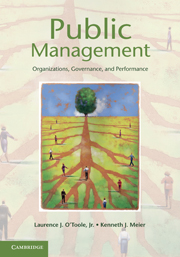Book contents
- Frontmatter
- Contents
- List of figures
- List of tables
- Preface
- 1 Public management and performance: an evidence-based perspective
- 2 A model of public management and a source of evidence
- 3 Public management in interdependent settings: networks, managerial networking, and performance
- 4 Managerial quality and performance
- 5 Internal management and performance: stability, human resources, and decision making
- 6 Nonlinearities in public management: the roles of managerial capacity and organizational buffering
- 7 Public management in intergovernmental networks: matching structural networks and managerial networking
- 8 Public management and performance: what we know, and what we need to know
- Glossary
- References
- Index
Preface
Published online by Cambridge University Press: 05 June 2012
- Frontmatter
- Contents
- List of figures
- List of tables
- Preface
- 1 Public management and performance: an evidence-based perspective
- 2 A model of public management and a source of evidence
- 3 Public management in interdependent settings: networks, managerial networking, and performance
- 4 Managerial quality and performance
- 5 Internal management and performance: stability, human resources, and decision making
- 6 Nonlinearities in public management: the roles of managerial capacity and organizational buffering
- 7 Public management in intergovernmental networks: matching structural networks and managerial networking
- 8 Public management and performance: what we know, and what we need to know
- Glossary
- References
- Index
Summary
How effective are public managers as they seek to influence the efforts of public organizations to deliver policy outputs and outcomes? How, and how much, is management related to public program performance? What aspects of management can be distinguished, and can their separable contributions to performance be estimated? How do managers deal with internal operations, opportunities in the environment, and threats or shocks from outside the organization? Can the networking behavior of managers and the networked structures in which many public organizations sit shape policy results – for good or ill?
In this book we address these salient questions – and more. Whereas in an earlier volume (Meier and O'Toole 2006) we explored the relationship between democratic governance systems and public bureaucracy via the literatures of political science and public administration, and used empirical analyses to sort through the issues, in this new book we put the politics-and-administration theme to one side – mostly – to focus on management and performance. This approach does not mean that we reconstruct some sort of implicit politics/administration dichotomy. Indeed, the role that public managers occupy includes some highly political elements, and some of our work on management and performance demonstrates some explicitly political patterns. It turns out, for instance, that managerial interactions with external stakeholders shape the outcomes of their organizations in ways that reflect the distribution of power in their settings.
- Type
- Chapter
- Information
- Public ManagementOrganizations, Governance, and Performance, pp. xi - xivPublisher: Cambridge University PressPrint publication year: 2011

